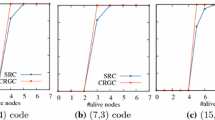Abstract
The optimal tradeoff between node storage and repair bandwidth is an important issue for distributed storage systems (DSSs). For realistic DSSs with clusters, while repairing a failed node, downloading more data from intra-cluster nodes than from cross-cluster nodes is effective. Therefore, differentiating the repair bandwidth from intra-cluster and cross-cluster is useful. For cluster DSSs, the tradeoff is considered with special repair assumptions where all alive nodes are used for repairing a failed node. In this paper, we investigate the optimal tradeoff for the cluster DSSs under more general storage/repair parameters. Furthermore, we propose a regenerating code construction strategy that achieves the points in the optimal tradeoff curve for the cluster DSSs with specific parameters as a numerical example. Moreover, we consider the influence of separate nodes for the tradeoff for the DSSs with clusters and separated nodes.
Similar content being viewed by others
References
Hu C, Li X L, Zhang M, et al. Optimal repair layering for erasure-coded data centers. ACM Trans Storage, 2017, 13: 1–24
Zhang Y, Li H, Li R S. Repair tree: fast repair for single failure in erasure-coded distributed storage systems. IEEE Trans Parallel Distrib Syst, 2017, 28: 1728–1739
Huang C, Chen H, Li J. Pyramid codes: flexible schemes to trade space for access efficiency in reliable data storage systems. In: Proceedings of the 6th IEEE International Symposium on Network Computing and Applications, Cambridge, 2007
Dimakis G, Godfrey P B, Wu Y N, et al. Network coding for distributed storage systems. IEEE Trans Inf Theory, 2010, 56: 4539–4551
Ernvall T, Rouayheb E, Hollanti C, et al. Capacity and security of heterogeneous distributed storage systems. IEEE J Sel Areas Commun, 2013, 31: 2701–2709
Yu Q, Shum W, Sung C W. Tradeoff between storage cost and repair cost in heterogeneous distributed storage systems. Trans Emerg Telecommun Technol, 2015, 26: 1201–1211
Akhlaghi S, Kiani A, Ghanavati R. Cost-bandwidth tradeoff in distributed storage systems. Comput Commun, 2010, 33: 2105–2115
Ford D, Labelle F, Popovici I, et al. Availability in globally distributed storage systems. In: Proceedings of the 9th USENIX Conference on Operating Systems Design and Implementation, Vancouver, 2010
Hu C, Lee P P C, Zhang X Y. Double regenerating codes for hierarchical data centers. In: Proceedings of IEEE International Symposium on Information Theory (ISIT), Barcelona, 2016. 245–249
Hou H X, Lee P P C, Shum K W, et al. Rack-aware regenerating codes for data centers. 2018. ArXiv:1802.04031
Prakash N, Abdrashitov V, Médard M. The storage vs repair-bandwidth trade-off for clustered storage systems. IEEE Trans Inf Theory, 2017. ArXiv:1701.04909
Pernas J, Yuen C, Gastón B, et al. Non-homogeneous two-rack model for distributed storage systems. In: Proceedings of IEEE International Symposium on Information Theory (ISIT), Istanbul, 2013. 1237–1241
Sohn Y, Choi B, Yoon S W, et al. Capacity of clustered distributed storage. In: Proceedings of IEEE International Conference on Communications (ICC), Paris, 2017
Kubiatowicz J, Weimer W, Wells C, et al. OceanStore: an architecture for global-scale persistent storage. SIGPLAN Notice, 2000, 35: 190–201
Dimakis G, Ramchandran K, Yunnan Wu K, et al. A survey on network codes for distributed storage. Proc IEEE, 2011, 99: 476–489
Rashmi V, Shah N B, Kumar P V. Optimal exact-regenerating codes for distributed storage at the MSR and MBR points via a product-matrix construction. IEEE Trans Inf Theory, 2011, 57: 5227–5239
Li Y R, Yeung R W, Ning Cai R W. Linear network coding. IEEE Trans Inf Theory, 2003, 49: 371–381
Ahlswede R, Cai N, Li S, et al. Network information flow. IEEE Trans Inf Theory, 2000, 46: 1204–1216
Smith K, Ahuja R K, Magnanti T L, et al. Network flows: theory, algorithms, and applications. J Oper Res Soc, 1994, 45: 1340
Goparaju S, Fazeli A, Vardy A. Minimum storage regenerating codes for all parameters. IEEE Trans Inf Theory, 2017, 63: 6318–6328
Acknowledgements
This work was partially supported by National Natural Science Foundation of China (Grant No. 61571293), China Program of International S&T Cooperation (Grant No. 2016YFE0100300), and SJTU-CUHK Joint Research Collaboration Fund 2018. The authors would like to thank Prof. Kenneth W. Shum for the help in improving this paper.
Author information
Authors and Affiliations
Corresponding author
Additional information
Invited paper
Rights and permissions
About this article
Cite this article
Wang, J., Wang, T. & Luo, Y. Storage and repair bandwidth tradeoff for distributed storage systems with clusters and separate nodes. Sci. China Inf. Sci. 61, 100303 (2018). https://doi.org/10.1007/s11432-018-9499-0
Received:
Revised:
Accepted:
Published:
DOI: https://doi.org/10.1007/s11432-018-9499-0




